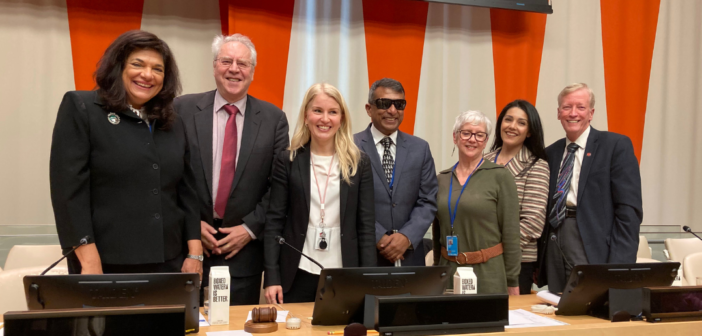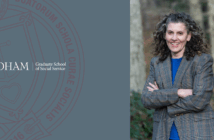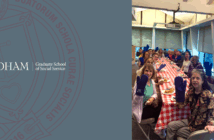On Monday, April 3, the Graduate School of Social Service co-sponsored the 39th annual Social Work Day at the United Nations (UN), held in person for the first time at the United Nations since the beginning of the COVID-19 pandemic.
Hundreds of social work professionals, students, and faculty gathered in the ECOSOC Chamber of the United Nations to discuss this year’s event theme, “Creating a More Inclusive World: Overcoming Barriers to EnABLE Environments.”
The event was co-sponsored by the Department of Economic and Social Affairs of the UN and the Permanent Mission of Finland to the UN, the International Association of Schools of Social Work (IASSW), the International Council on Social Welfare (ICSW,) the International Federation of Social Work (IFSW), the National Association of Social Workers (NASW), the Council on Social Work Education (CSWE), Fordham University Graduate School of Social Service, Monmouth University School of Social Work, and Rutgers University School of Social Work.
Fordham GSS Professor and Mary Ann Quaranta Endowed Chair for Social Justice for Children Shirley Gatenio Gabel, Ph.D., provided opening remarks.
“This is a topic all social workers should know more about,” she said, acknowledging the theme of disability and accessibility. “It is critical that we acknowledge that people who have power knowingly and unknowingly shape their environment … and shut others out.”
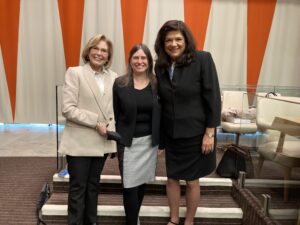
From left to right: Dr. Linda White-Ryan, Dr. Janna Heyman, Dr. Shirley Gatenio Gabel
According to the World Health Organization, 16% of the global population—1.3 billion people—experience a significant disability. The issues arise in the systems and environments in which that 16% has to navigate—a system not designed with them in mind, and thus results in a difficult existence.
How can society change these systemic issues that hinder the quality of life of many global citizens? How can social workers advocate for that change in their communities and broader policy? This event gathered some of the best minds in social work to promote what is already being done and assimilate opportunities for action moving forward.
Social Workers as ‘Crucial Stakeholders’ in Accessibility Work
ICSW Executive Director Sergei Zelenev began the panel discussion by acknowledging social workers as “crucial stakeholders” in helping those with disabilities to operate independently. He continued that as social workers continue to advocate for this population, they must remember that the advocacy work is not classifying those with disabilities as “passive objects of charity” but as “rights holders capable of receiving their rights.”
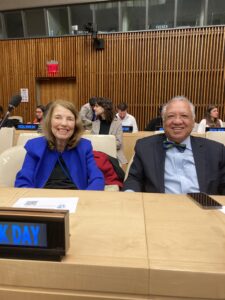
Dr. Elaine Congress (left) with Cudore L. Snell, US Committee ICSW member, and Howard University Professor.
John Wilmoth, Officer-in-Charge of the UN DESA’s Division for Inclusive Social Development and the Director of the Population Division, served as the opening panel speaker. Despite the persisting stigmas about the limitations of those with disabilities resulting in a “failure to acknowledge” their “individual knowledge and backgrounds,” Wilmoth said, global digitization is redefining ways for this population to access social services and interact with society.
“Social media brought tools and spaces for those with disabilities to engage with wider society and their peers,” Wilmoth said. “We can and must include those with disabilities in [the progress of]digitization.”
Wilmoth explained that while digitization is a positive catalyst for accessibility progress, unfortunately, those with disabilities can sometimes miss out on those technological benefits. Digital tools require basic needs such as electricity, wifi, and the hardware to operate them. Due to the aforementioned stigma and resulting societal disadvantage, those with disabilities can find themselves without access to those resources.
The UN’s DESA Division, Wilmoth said, has framed this lack of access as a right and development issue.
“Five out of the UN’s 17 sustainable development goals include those with disabilities,” he said.
“Strengthening partnerships is key to creating an environment to let those with disabilities realize their human rights.”
An Investment in Human Capital
Helena Jauhiainen, the Permanent Mission of Finland to the United Nations’ first secretary, spoke next, explaining how Finland prioritizes accessibility for its citizens. She noted that the country’s heavy investment in social policies like high taxation allows a larger allocation of resources devoted to issues like accessibility.
“Investing in [our citizens’]well-being is investing in human capital and society,” she said.
Jauhiainen noted that social work is an “instrument for realizing social development and inclusion;” however, unless accessibility is put into practice, participation by those with disabilities isn’t possible.
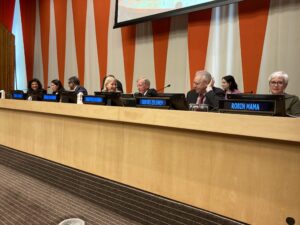
Speakers at Social Work Day at the UN on stage.
Monmouth University School of Social Work Dean Robin Mama introduced the next speaker, Gopal Mitra, UNICEF’s Global Lead on Disability. Mitra’s presentation was titled “Social Work and Children with Disabilities.”
Mitra, who lost his vision in 2000 from an explosion while serving in the Indian Army, spoke of social workers’ critical role in advocating for children with disabilities. He also highlighted how those with disabilities are not equitably represented in the global workforce.
“If you go into a school or institution with 200 people, 20 will have a disability,” he said. “This is not the same for the workplace.”
One in ten children has a disability, Mitra said. And it’s the responsibility of organizations like UNICEF and the UN to “not only break down the current barriers” that gatekeep this population but also “not make new ones” for them to navigate.
“Children with disabilities are first and foremost children,” he said.
Mitra finished by encouraging audience members to visit the UNICEF Disability Inclusion Training Package — which contains a toolkit, video modules, and checklists for those working on the front lines.
When Those We Love Are Impacted by Disability
The next two speakers of the event told stories of close loved ones impacted by disability and how that has given further passion to their work and advocacy.
Patricia Welch Saleeby, Ph.D., social work program director and associate professor at Bradley University, has a sister with Down Syndrome. She spoke about how, growing up, society assumed her sister couldn’t do certain things because of her disability. Saleeby, on the other hand, only saw what her sister could do.
“She was a lot like me,” Saleeby said. “When others thought she couldn’t do something because of her disability, it angered me.”
These same frustrations continued as Saleeby entered her doctoral program and progressed throughout her career. She saw a common theme in society’s stigma toward those with disabilities.
“Societal attitudes are really what’s disabling,” she said.
As a Ph.D. student at the University of Washington, Saleeby was diagnosed with a heart condition — but would not let that stop her pursuit of dispelling this stigma. She connected with Dr. David Gray, renowned for his advocacy and research on behalf of individuals with disabilities. Gray, who passed away in 2015, was specifically known for advancing the role of psychological principles to enhance the lives of people with disabilities and promote their participation in society.
“I thought, this meshes well with the social work values of seeing a person in their environment,” Saleeby said.
Saleeby took minutes for World Health Organization meetings ”to get in the room, not even at the table yet.” She is now working on developing a series of International Classification of Functioning, Disability, and Health (ICF) curriculum training for social workers to make environments more accessible for those with disabilities. Her passion shines through her every word and action.
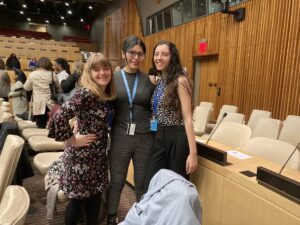
GSS student Julia Larock (right) with fellow UN interns on Social Work Day at the UN.
To end the panel, Walter X. Kalman, executive vice president of the American Association on Intellectual and Developmental Disabilities’ New Jersey chapter, described his experience as a parent of two children with disabilities. Kalman’s son has a developmental disorder, and his daughter was diagnosed with multiple sclerosis.
Kalman described himself as “always an activist” dating back to the Vietnam War and said that while parenting those with disabilities has “phases not unlike the grief process,” he approaches the situation without grief, noting that “when we change the way we look at things, the things we look at change.”
Kalman explained that his home state of NJ—with its 600 school districts—can be challenging for parents, especially those raising children with disabilities.
“That’s difficult to navigate even for a professional,” he said.
But even more difficult, Kalman said, was what life looks like for the child once that schooling is over or when their parents pass away. Society is not setting them up for success without systems to assist those children as they transition into adulthood.
Kalman used his closing statement to focus on action.
“Inclusion is just a word if we don’t do something to replacer the barriers that exclude,” he said.
